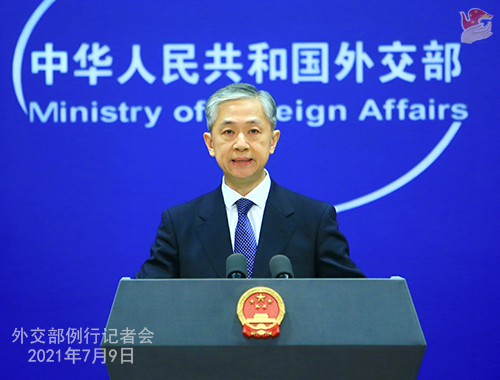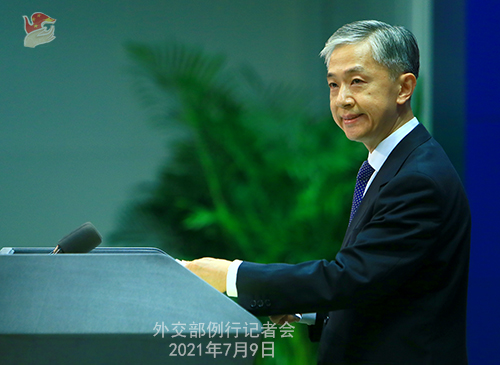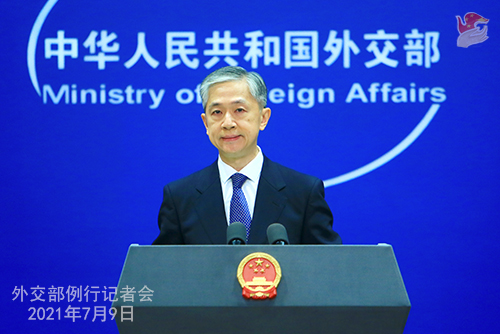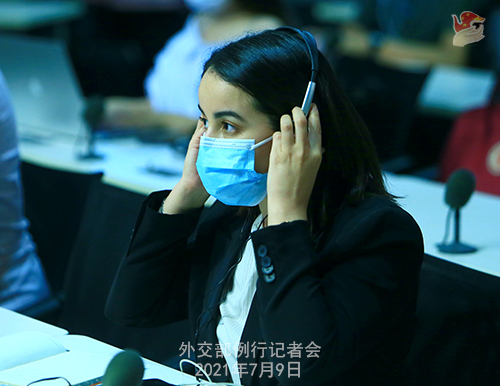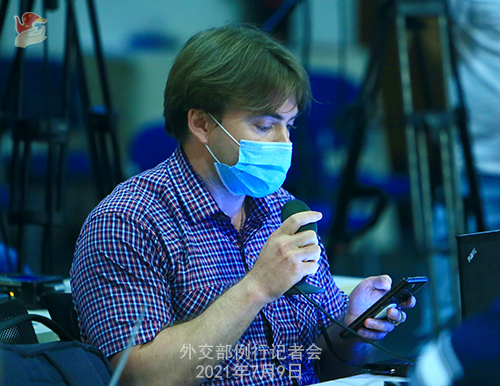| Foreign Ministry Spokesperson Wang Wenbin's Regular Press Conference on July 9, 2021 |
| 2021-07-09 21:46 |
|
At the invitation of Deputy Prime Minister and Foreign Minister Rashid Meredov of Turkmenistan, Foreign Minister Sirojiddin Muhriddin of Tajikistan, and Foreign Minister Abdulaziz Kamilov of Uzbekistan, State Councilor and Foreign Minister Wang Yi will visit Turkmenistan, Tajikistan and Uzbekistan, and attend the meeting of the Council of Ministers of Foreign Affairs of the Shanghai Cooperation Organization (SCO), the foreign ministers' meeting of the SCO-Afghanistan Contact Group and the high-level international meeting on "Central and South Asia: Regional Connectivity Challenges and Opportunities" from July 12 to 16. Xinhua News Agency: Can you brief us on the background, consideration and expectations of State Councilor and Foreign Minister Wang Yi's visit to the three Central Asian countries and his attendance of the SCO foreign ministers' meeting and other multilateral meetings? Wang Wenbin: Turkmenistan, Tajikistan and Uzbekistan are China's friendly, close neighbors and strategic partners. In May, the second China+Central Asia (C+C5) foreign ministers' meeting was successfully held in Xi'an, bringing China's relationship with Central Asian countries to a new level. As the SCO celebrates its 20th anniversary this year, it is now facing new opportunities for development. The developments of the situation in Afghanistan is at a critical juncture. As close neighbors of Afghanistan, the SCO member states can play a positive role in promoting the peace, reconciliation and reconstruction process in Afghanistan. Better connectivity is the common aspiration of countries in Central and South Asia and is also an important part of the BRI cooperation. Against this background, State Councilor and Foreign Minister Wang Yi's visit is an important diplomatic mission aimed at consolidating traditional friendship and cooperation with Central Asian countries, advancing the development of the SCO, promoting peace and stability in Afghanistan, and strengthening joint efforts to build the BRI and enhance connectivity. During the visit, State Councilor and Foreign Minister Wang Yi will meet with leaders of the three Central Asian countries, hold talks with their foreign ministers, attend multilateral events including the SCO foreign ministers' meeting and have friendly exchanges with foreign ministers of other participating countries. We believe that this visit will be a robust move to implement the important common understanding reached between President Xi Jinping and leaders of other countries, deepen bilateral and multilateral cooperation, promote high-quality BRI cooperation, and make new contributions to regional peace and stability. China-Arab TV: Many students from Arab countries are hoping very much to return to China for their studies. When will China allow these students to return? Wang Wenbin: The Chinese government always attaches high importance to the issue of foreign students coming to China for their studies. On the basis of ensuring safety amid COVID-19, we will consider in a coordinated manner arrangement for allowing foreign students to return to China for their studies. China Daily: It is reported that in response to a question about the US refusal of visa applications by Chinese students, a spokesperson for the US State Department stated that the relevant measures are based on Presidential Proclamation 10043 and only affects less than 2% of Chinese applicants. The spokesperson said that the US welcomes international students including Chinese students. Do you have any comment? Wang Wenbin: The current US administration keeps talking about the importance it places on openness to international students while playing by the rules set out in this deeply discriminatory Presidential Proclamation. This runs counter to the self-claimed philosophy of openness and freedom and remarks of "welcoming Chinese student" on the US side. It is further historical back-pedalling. The US claims that the relevant measures only affect less than 2% of Chinese applicants. However, a Georgetown University report estimates that about 3,000 to 5,000 graduate students applying for relevant disciplines are affected by Presidential Proclamation 10043, which is between 16% and 27% of annual new Chinese graduate enrollments. Large numbers of students who are affected by the Proclamation launched a website on their own initiative to tell the stories of being rejected and call for academic freedom. The US should heed their voice. People-to-people interactions are the foundation of China-US ties. Academic, educational and scientific and technological exchanges are an important part of that. We urge the US to face up to and review this issue, stop the groundless restrictions and suppression on Chinese students, and protect their legitimate rights and interests. Reuters: The S&P Dow Jones Indices and FTSE Russell on late Wednesday decided to remove more Chinese companies from their indices after an updated U.S. executive order barred domestic investment in firms with alleged ties to China's military. What's the ministry's comment on this? Does it have plans to retaliate over this measure? Wang Wenbin: China firmly opposes politicizing economic and trade issues, abusing national power, and overstretching the concept of national security to groundlessly suppress Chinese companies. The relevant actions run severely against market competition and other international economic and trade rules that the US claims to value, and against the trend of our times. They undermine the interests of investors of all countries, and do harm to the interests and image of US itself. China is opening up its capital market wider and wider. The exclusion of some enterprises from certain international indexes poses no obstacle for international investors who can invest in them in various ways to share the dividends of China's development. Relevant indices' removal of Chinese quality enterprises will only dent their own authority and representation, which is their loss.
PTI: You just answered two questions regarding the return of the international students to China and the discriminatory treatment of Chinese students by the US. Is there a timeline for foreign students to return to China? Wang Wenbin: I just stated China's principled position on the issue of foreign students coming back to China for their studies. We attach high importance to this issue. On the basis of ensuring safety amid COVID-19, we will consider in a coordinated manner arrangement for allowing foreign students to return to China for their studies. At the same time, I stress again that in light of the evolving epidemic situation, China will decide on prevention and control measures in a coordinated way based on scientific analysis. We stand ready to work actively towards the healthy, safe and orderly cross-border flow of people on the basis of sound epidemic measures. People's Daily: Can you brief us on the main items on the agenda of the SCO foreign ministers' meeting and the SCO-Afghanistan Contact Group foreign ministers' meeting and China's expectations for the meetings? Wang Wenbin: During the SCO foreign ministers' meeting, State Councilor and Foreign Minister Wang Yi will exchange views with fellow SCO member states' foreign ministers on major international and regional issues and SCO cooperation in various fields under the current circumstances to make political preparations for a SCO summit this year. This year marks the 20th anniversary of the founding of the SCO. During the past two decades, the SCO has upheld the Shanghai Spirit and blazed a successful trail of cooperation and development that is in keeping with regional realities and the needs of all parties. It has become a major constructive force for regional security, stability, development and prosperity. Its progress also represents valuable practical exploration in the building of a new type of international relations and a community with a shared future for mankind. Amid the overlapping impact of major changes and a global pandemic unseen in a century, the SCO, as a new type of international organization championing an up-to-date vision, needs to play a bigger role in realizing lasting peace and security in the region, boosting economic recovery in various countries and defending international fairness and justice. China stands ready to work with all parties to build on the opportune momentum of the SCO's 20th anniversary to deepen solidarity and mutual trust between member states, build up consensus for cooperation, SCO cooperation across the board, and inject strong impetus into regional countries' development and rejuvenation. As agreed by the SCO member states, the foreign ministers' meeting of the SCO-Afghanistan Contact Group will be held in conjunction with the SCO foreign ministers' meeting. State Councilor and Foreign Minister Wang Yi and other SCO member states' foreign ministers will exchange views with the foreign minister of Afghanistan on promoting regional security and stability, advancing the peace and reconciliation process in Afghanistan, and deepening SCO cooperation with the Afghan side. The SCO member states' foreign ministers will release a joint statement elaborating on their unified position on the Afghan issue. Against the backdrop of the hasty withdrawal of US and NATO forces and the complicated evolution of the situation in Afghanistan, this meeting is of important significance for properly dealing with the changing situation in post-withdrawal Afghanistan, jointly advancing the peace and reconciliation process, strengthening efforts to fight the three evil forces, namely, terrorist, separatist and extremist forces, and effectively maintaining regional security and stability. China stands ready to work with all parties to give full play to the role of the SCO-Afghanistan Contact Group and contribute more SCO strength to Afghanistan's efforts to maintain stability, end chaos, realize peace and advance reconstruction. Reuters: The Biden administration is set as early as Friday to add at least 10 more Chinese companies and other entities to its economic blacklist over alleged human rights abuses and high-tech surveillance in Xinjiang. This is according to two sources cited by Reuters. Is the ministry aware of this? What's the ministry's comment on this? Wang Wenbin: The so-called "entity list" of the US is in essence a tool for suppressing specific companies and industries in China under the pretext of human rights, and means the US uses to destabilize Xinjiang and contain China. China firmly opposes this. China will take all necessary measures to resolutely safeguard the legitimate rights and interests of Chinese companies and foil US attempts to interfere in China's internal affairs. Global Times: An exhibition featuring the "comfort women" in Nagoya, Japan was forced to close on July 8 after staff at the gallery hosting it received a delivery containing an explosive device. Items on display include the "Statue of a Girl of Peace" which symbolizes the "comfort women" victims. The exhibition attracted many visitors but was again rejected and boycotted by right-wing forces in Japan. Do you have any response? Wang Wenbin: We noted relevant reports. The forced recruitment of "comfort women" is a grave crime against humanity committed by the Japanese militarism during its war of aggression. The iron-clad fact has long been recognized and recorded in historical documents including the minutes of Temporary Courts Martial at Batavia and judgments of the International Military Tribunal for the Far East. However, certain forces in Japan have all along stubbornly clung to the wrong perception on historical issues. Their actions show great disrespect to the victims and attempt to deny, distort or even whitewash the history of aggression, downplay and shirk responsibility for past crimes. They deserve to be condemned by justice and conscience. History is the best textbook. Unless Japan faces up to and deeply reflects upon itself, it will never be able to unload its heavy burden, and the hollow morality and responsibility it talks about will never be truly accepted by the international community.
CCTV: The 47th session of the UN Human Rights Council is being held at Geneva. We noted that China made multiple statements criticizing severe human rights problems in Western countries. Some western countries claim that China's opposition to megaphone diplomacy and interference in other countries' internal affairs seem to have changed. Do you have any comment? Wang Wenbin: China and other developing countries expressed their concerns over the human rights conditions in some western countries on multiple occasions during the 47th session of the UN Human Rights Council, urging them to take effective measures to resolve their own severe human rights problems and opposing their politicization of human rights issues and double standard. This is a call of justice. I want to stress that it is these Western countries that pressure other countries and interfere in other countries' internal affairs out of political motivations based on disinformation, rumors and lies. It is these Western countries that name and shame developing countries with finger-pointing and condescending lecturing. Such acts spoil the cooperative atmosphere at the UN Human Rights Council, and run counter to the purposes and principles of the UN Charter. They claim to welcome criticism, but when China and other developing countries express legitimate concerns over their human rights situation, they feel very uncomfortable and even resistant. Moreover, they turn around and accuse China of "megaphone diplomacy" and interference in other countries' internal affairs. This typical practice of double standard fully exposes their deeply-rooted arrogance, prejudice and hypocrisy. Why do they turn a blind eye to some Western countries' systematic discrimination against minority groups including people of Asian and African descent, violation of the rights of indigenous peoples, large-scale human rights abuse in immigrant detention centers, killing of innocent civilians in overseas military operations, casualties and displacement of civilians caused by military intervention, human rights violations by unilateral coercive measures, and other human rights problems? Why don't they openly criticize their partners at the Human Rights Council? Why do they play dumb in the face of criticism from the international community? Whether they are the true defender of human rights or just politicizing human rights, the international community sees clearly. China advises these Western countries to seriously respond to the concerns of the international community, deeply reflect on their own deplorable human rights records, honestly face up to and solve their own human rights problems. If these countries still believe that they can go on wantonly interfering in other countries' internal affairs under the pretext of human rights and harming their interests without paying any price, they should think again. Kyodo News: We've learned that the case of Cheng Lei, an Australian citizen suspected of illegally providing state secrets to foreign countries, has been handed over to the procuratorate for review and prosecution. Can you confirm this? Wang Wenbin: We've stated China's principled position on the case of Australian citizen Cheng Lei many times. She was arrested on suspicion of illegally providing state secrets to foreign forces in accordance with law. The case is under further process. China is a country governed by law. China's judicial authorities handle cases in accordance with law and the rights of Cheng Lei are fully protected. Shenzhen TV: Recently, mainstream Australian media published articles commemorating the 50th anniversary of former Australian Prime Minister Gough Whitlam's visit to China, including articles written by Whitlam back then about his observations and insights during the visit. Whitlam believes that it is an unavoidable and objective reality that the CPC is in power in China and that Australia should have diplomatic relations with China which conforms to the trend of the times. Do you have any comment? Wang Wenbin: We noted relevant reports. In July 1971, Mr. Gough Whitlam led a delegation to pay an "ice-breaking" visit to China as the leader of the Australian opposition Labor Party, making important and indelible contributions to the establishment of diplomatic relations between China and Australia and the growth of bilateral ties. Looking back at this "ice-breaking" visit 50 years ago, people from different social sectors in Australia say that Mr. Whitlam exemplified great political wisdom, confidence and courage in choosing to establish diplomatic ties with China, a decision based on rational thinking by grasping and following the trend of the times. What he did shows that Australia is more than able to lead, rather than blindly follow, other countries in international affairs. They call on the Australian government to handle its relations with China in the same pragmatic and rational approach. With relations between China and Australia severely strained, these thoughts and appeals are cause for some soul searching on the part of the Australian government. The two sides had more differences 50 years ago than today. Why is it that the Australian statesmen back then had the vision to follow the overwhelming trend and begin cooperation with China and engagement with Asia despite obstacles while today certain people in the Australian government are led astray by bias and choose to move against the invincible trend, constantly obstructing bilateral cooperation and even inciting confrontation? We urge the Australian side to take history as a mirror, heed the voice of insightful people at home, and revisit the original purpose of the establishment of diplomatic relations between China and Australia. We call on it to reject Cold-War mentality and ideological bias, do more things to promote bilateral mutual trust and cooperation in keeping with the spirit of the two sides' comprehensive strategic partnership and the interests of the two peoples, and refrain from historical retrogression. AFP: I have two questions. The first one, the European Parliament passed a resolution yesterday calling for EU officials to boycott the Beijing Winter Olympics over human rights concerns in Hong Kong and Xinjiang. What's the foreign ministry's response to this? The second question, what's China response to the situation surrounding the assassination of Haiti's President, including the announcement by Taiwan that 11 suspected assassins have been arrested on its embassy grounds? Wang Wenbin: On your first question, what you mentioned is not worth any attention. On your second question, we noted relevant reports. I want to stress that there is only one China in the world and Taiwan is part of China. The government of the People's Republic of China is the sole legal government representing the whole of China. With regard to the situation in Haiti, we hope Haiti can restore social stability at an early date, achieve sound economic development and safeguard people's wellbeing.
Beijing Youth Daily: According to media reports, the US troops pulled out of the Bagram Airfield overnight without a heads up. The sudden departure made it difficult for the Afghan government to take over the facility and led to the loss of numerous items. The battlefield in Afghanistan has gone out of hand after the withdrawal of US troops. The irresponsible approach of the US has been criticized in Afghanistan and the international community. Do you have a comment? Wang Wenbin: As so many facts have proven, between the morally right thing to do in the world and selfish interests, the US always chooses the latter. The US has been trying to force its so-called freedom and democracy on others and push for regime changes around the world. This has led to conflict, war, terrorism, refugees, among other complications that still persist today. The US, in disregard of its responsibilities and obligations, hastily withdrew from Afghanistan, leaving a mess and turmoil to the Afghan people and regional countries. This further exposed the hypocritical face of the US under the cover of "defending democracy and human rights". As a friendly close neighbor of Afghanistan, China always supports the Afghan people in safeguarding their national sovereignty, independence and territorial integrity and taking national destiny into their own hands. China always follows the "Afghan-owned and Afghan-led" principle and strives to promote the political settlement of the Afghan issue. We stand ready to work together with the international community and regional countries to advance the peace and reconciliation process and help Afghanistan realize peace and stability at an early date. Bloomberg: I just want to follow up on your comments on the Afghanistan withdrawal. In an earlier question on that, you said that the US had made a hasty withdrawal, and now you said that the US rushed to withdrawal its troops and left the people there in a mess. Are you saying that the US should have left the soldiers in Afghanistan for a longer period of time? Wang Wenbin: I'm afraid you didn't get our position right. Our position is consistent and clear. As the culprit that created the Afghan issue, the US cannot shirk its responsibility for the current situation. It should earnestly assume its due responsibility in such areas as Afghanistan's security, development and humanitarian needs, honor its commitment, ensure a smooth transition in Afghanistan, make sure the withdrawal doesn't lead to turbulence and fighting, and make sure Afghanistan won't become a powder keg in the region and a safe haven for terrorism again. This is our clear position. NHK: Japan announced last night that after talks with relevant sides of the IOC, it has been decided that some events of the Tokyo Olympic Games will be held without audience. Do you have any comment? Wang Wenbin: We note reports on that. China supports Japan in smoothly hosting a successful Tokyo Olympic Games. China News Service: Lately some in the US are prompting the WHO to conduct a "phase two investigation of COVID-19 origins" targeting China. Do you have any comment? Wang Wenbin: Study of origins is a scientific matter which calls for respecting science and facts. The report of the joint WHO-China study has pointed out that a global perspective is needed to carry out future origin-tracing work in multiple countries and regions instead of just one area. The overall situation of COVID-19 epidemics is increasingly pointing to multiple origins in multiple places. The mayor of Belleville, New Jersey, who has tested positive for coronavirus antibodies, said he was sick with the virus in November 2019, over two months earlier than the first confirmed case in the US and also earlier than the first case reported in China. According to the US NIH website, research has shown that evidence of infection in five states appeared back in December 2019. A joint study by UCLA and the University of Washington concluded, "A significantly higher number of patients with respiratory complaints and diseases starting in late December 2019 and continuing through February 2020 suggests community spread of SARS-CoV-2 prior to established clinical awareness and testing capabilities". Besides, many media reports have shown that as EVALI broke out in July 2019 in Wisconsin and swept through other states, CT scans of patients' lungs show white patches with ground glass opacity, highly similar to the symptoms of COVID-19. We have seen some other research concluding that the coronavirus had been spreading in many places around the world before the outbreak in Wuhan. The scientific findings of the first phase of study of origins conducted in China by the WHO-China joint mission provides a research basis for conducting similar study of origins in other countries. To turn a blind eye to these facts and the authoritative report of WHO experts, and to clamor for a so-called second phase of study of origins targeting China, this is not the right way to identify the origin of the virus. It is political manipulation that puts a label on the virus and politicizes study of origins and will only disrupt and undermine international cooperation in this area. The international community should reject all acts of political manipulation on origin-tracing, follow the WHO joint team's suggestion and conduct origin-tracing in multiple countries and regions to ensure effective prevention and preparedness in the face of future pandemics.
TASS: In an interview with France 2 TV, French Minister of State for European Affairs Clément Beaune openly called on other members of the EU not to use vaccines developed and produced in Russia and China. Do you have any comment? Wang Wenbin: China always holds that countries should enhance cooperation, rather than create differences in the face of COVID-19. Issues relating to the approval and authorization of vaccines should be handled by management agencies for medical products in accordance with science and laws and regulations. Efforts should be made to avoid political interference and political manipulation. CCTV: Today marks the 50th anniversary of Dr Henry Kissinger's secret trip to China. What inspiration can be drawn from this historic event? Wang Wenbin: Half a century ago, on July 9, 1971, Dr. Henry Kissinger paid a visit to China. The older generation of Chinese leaders including Mao Zedong and Zhou Enlai worked in concert with President Nixon and Dr. Kissinger, among others, and opened the door to renewed exchange between China and the US for the shared interests of the two peoples. This marked the beginning of a new historical chapter of the improvement and development of China-US relations and has profound positive implications on both countries and the world. During the past 50 years, China-US relations have weathered changing circumstances and kept moving forward overall, delivering enormous benefit to the two peoples and making significant contribution to world peace, stability and prosperity. An important inspiration from this historical chapter is that though China and the US have different social systems and vary in historical backgrounds and cultural traditions, as long as both remain committed to the correct course of bilateral ties, always proceed from the common interests of people in both countries and the rest of the world, and follow the principle of mutual respect, equality, and seeking common ground while shelving differences, China and the US are fully capable of realizing peaceful coexistence and mutually-beneficial cooperation and bringing greater benefit to both countries and the world. Today China-US relations are at a new historical crossroads, with the choice between hostile confrontation and mutual respect, between isolationist decoupling and open cooperation, between zero-sum game and win-win results. The two peoples and the international community are all watching with great concern. We hope the US will grasp the overwhelming global trend of our times, come to a correct perception of China, make the right choice and work with China in the same direction. Bloomberg: I just want to follow up on my question on Afghanistan. You said that the US should honor its commitment and ensure there's a peaceful transfer and that Afghanistan doesn't become a safe haven for terrorism. Can you explain what you mean specifically by that? Wang Wenbin: I don't see a need for further explanation here either. The US should earnestly fulfill its due responsibilities and honor its commitment. It needs to ensure a smooth transition in Afghanistan, make sure the withdrawal doesn't lead to turbulence and fighting, and prevent a resurgence of terrorism in the country. I believe this is what regional countries and the whole world want. As I just said, China and relevant countries will soon hold the SCO foreign ministers' meeting and the SCO-Afghanistan Contact Group foreign ministers' meeting, where further discussions will be held on the Afghan issue. You may follow up for more information.
|
